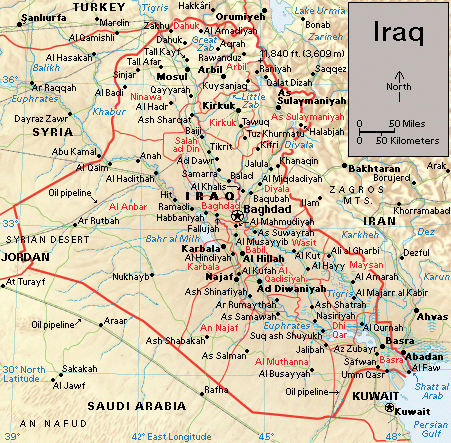Power Struggle Further Weakens Iraqi Government
August 11, 2014
The new president of Iraq, Fouad Massoum, today named Haider al-Abadi, a prominent Shi`ite politician, as prime minister and called on Abadi to form a new government. “Now the Iraqi people are in your hands,” stated Massoum at Abadi’s swearing in ceremony in Baghdad. Abadi is a member of the ruling party and previously served as deputy speaker of Iraq’s parliament.
While the move would appear to dislodge incumbent Nouri al-Maliki after eight years as prime minister, Maliki has defiantly declared his intention to remain in power. This morning, he petitioned the Iraqi Supreme Court, reiterating his claim that as head of the ruling State of Law coalition, he alone should be charged with choosing a new prime minister: “The coalition is only represented by its head . . . Mr. Nouri Kamel al-Maliki, and no other member in the leadership has the right to sign any papers or documents or agreements.” Politicians who remain loyal to Maliki have appeared on Iraqi television and condemned Abadi’s appointment as unconstitutional. According to media correspondents on the scene in Baghdad, Maliki has mobilized security troops loyal to him as well as army units, and there are tanks in the streets in some areas of the capital. Maliki’s refusal to share power with Iraq’s Sunni minority is widely seen as a major factor in the current Sunni jihadist rebellion in the northwest.

Thousands of Zezidis remain trapped on Mount Sinjar in northwestern Iraq by ISIS forces, who consider the Zezidis to be heretics to Islam. (World Book map)
The intense power struggle in Baghdad further exposes what remains of Iraq to the dire militant threat posed by those jihadists known as the Islamic State of Iraq and Syria (ISIS). International affairs experts suggest that ISIS may take advantage of the chaos in Baghdad to advance on the city. However, an initial U.S. military assessment of American airstrikes against ISIS targets, which began on August 8, suggest that the rebels have been forced to disperse and travel more discreetly, slowing their drive south considerably. “They had been acting with impunity,” a U.S Air Force spokesperson reported today. “Now they realize they cannot travel up and down the roads in large groups.”
The power struggle also complicates a humanitarian crisis in the far northwest. ISIS rebels have trapped tens of thousands of Yezidis on Mount Sinjar and may already have slaughtered hundreds of them. ISIS rebels regard the Yezidis as devil worshipers. (Yezidi monotheistic beliefs are drawn from Christianity, Judaism, and Zoroastrianism.) The U.S. military is carrying out massive airdrops of food and water on Mount Sinjar in an attempt to save the trapped Yezidis. U.S. airstrikes on the ISIS militants aided in a Kurdish counteroffensive yesterday that allowed several thousand Yezidis to escape down the mountain and cross the border into Syria.
Additional World Book articles:
- Umayyad caliphate
- Iraq War
- Iraq 2012 (a Back in Time article)
- Iraq 2013 (a Back in Time article)
- Syria 2013 (a Back in Time article)
- Syria: The Roots of a Rebellion (a special report)


